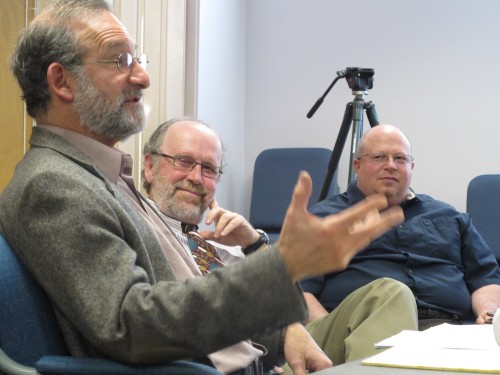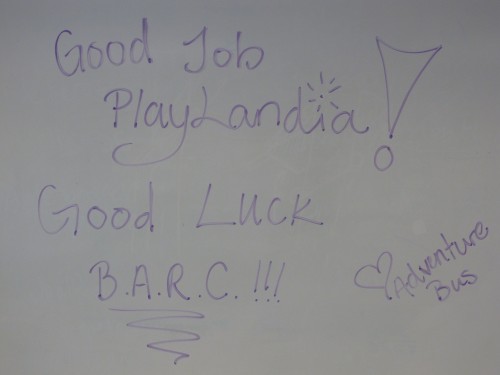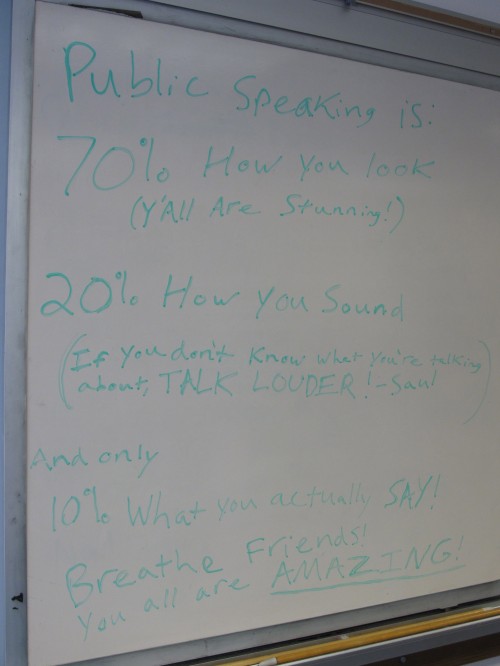Non-Profit Ninjas Slay the Behemoth
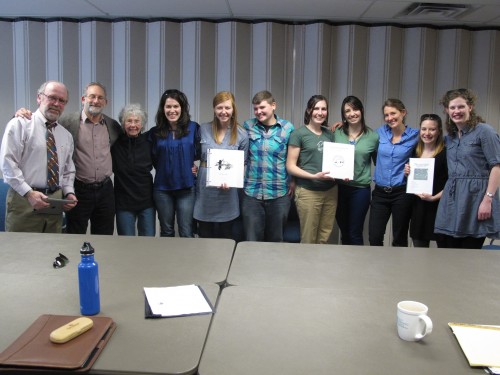
In the wintertime interim between teaching Mountain School in the fall and teaching Mountain School in the spring, graduate students in the North Cascades Institute Masters in Education program are skiing Mt. Baker’s slopes, exploring glassy blue glaciers, and visiting their old summertime haunts in Bellingham.
When, that is, they’re not hard at work on their non-profit project, something that tends to be, well, relatively rare.
The opportunity to design a non-profit organization is one that attracts several of the graduate students to this unique program. Earning this degree is not just about becoming a better naturalist, honing one’s teaching skills and developing intriguing curriculum. It is also a way to learn about designing a mission-driven business.
This winter, the eight members of graduate Cohort 13 created three non-profit models. Though these are a hypothetical practice, they can also be intended for the “real world” post-graduation. Several current non-profit organizations, such as Bellingham’s Wild Whatcom, started out as graduate student assignments; this year, Sarah Stephens created the Bellingham Adaptive Recreation Coalition with her sister, a graduate of Western. Though still “just” hypothetical, their project has been intended from the start to become a viable local non-profit business.
Half of the C13 Foundation: Saul Weisberg offers feedback to the graduate students while Dr. John Miles and Jason Ruvelson (Finance Director of North Cascades Institute) look on. Photo by Katherine Renz.
At the end of our two months learning, drafting, revising and compiling our projects, we present a grant proposal to the “C13 Foundation”. This body is a hypothetical foundation dedicated to “improving the quality of life in the Pacific Northwest” through focusing on education about the environment through interdisciplinary, community-based projects. It is composed of our teachers, Saul Weisberg, the Executive Director of North Cascade Institute; Dr. John Miles, professor and former Chair of the Department of Environmental Studies at Huxley College; and various members of the North Cascades Institute staff. Each non-profit group has their “final” — an hour-long interview to assess how well their grant proposal aligns with the Foundation’s mission.
Curious as to what our recent missions, visions and strategies are? The following is a brief description of our three projects. –Katherine Renz
The Bellingham Adaptive Recreation Coalition (BARC)
The Bellingham Adaptive Recreation Coalition works with outdoor leisure organizations and other interested community businesses to facilitate recreational opportunities for people with disabilities. BARC’s mission is to promote empowerment for individuals with disabilities, creating a sense of community for all. Our vision is an inclusive community that promotes access to outdoor recreation for all bodies and all abilities.
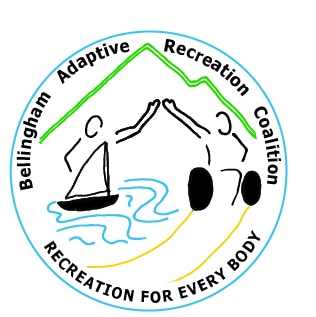
About 13% of the Whatcom County population identifies as having a disability. This computes to 25,815 people. According to a University of Washington study on disabilities in the state, 55% of people with disabilities reported that they are less likely to participate in community activities, including outdoor recreation, as compared to only 7% of people who do not have a disability. Many people with disabilities are often excluded from community interaction, stigmatized and need additional support. Individuals with chronic, or recently acquired disabilities often have to pave their own path to when it comes to involvement in recreational opportunities.
The Bellingham Adapted Recreation Coalition (BARC) aims to be a community resource that will partner with disability and health organizations, other recreational programs, universities and local businesses to create a truly integrated recreational community. Our flagship program, ‘Piping Sailors’, advocates for individuals and groups in their pursuit of recreation experiences by helping them adapt sailing to their ability level.
Adaptive sailing builds self-confidence that helps participants overcome other daily challenges. It promotes a more positive outlook on life, increases teamwork and leadership skills and benefits the physical condition of participant. Sailboats can be adapted for people with any level of ability. Through BARC’s partnership with Bellingham Parks and Recreation and the Community Boating Center, ‘Piping Sailors’ provides people a welcoming and inclusive environment to become community boaters. In addition, creating a welcoming and inclusive community means distilling the negative perspectives of people with disabilities amongst the general public. BARC’s DisAbility Awareness Campaign community outreach initiatives serve to reframe how people perceive what it means to be disabled. This program builds a supportive community that will further BARC’s mission and vision to provide recreation for every body. Designed by Sarah and Katie Stephens. Post written by Sarah Stephens.
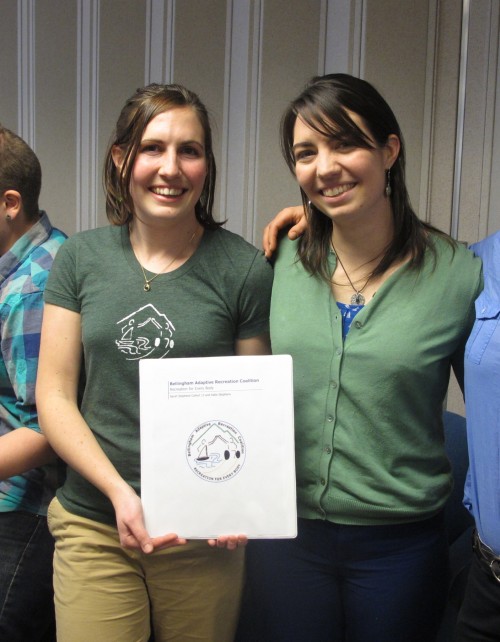 Graduate student Sarah Stephens with her sister, Western Washington University alumni and sailing teacher, Katie Stephens, are hoping to put their Bellingham Adaptive Recreation Coalition project into practice.
Graduate student Sarah Stephens with her sister, Western Washington University alumni and sailing teacher, Katie Stephens, are hoping to put their Bellingham Adaptive Recreation Coalition project into practice.
Interview day! Though all three groups compete for funding from the same hypothetical grant foundation, we support each other — unhypothetically! Photo by Katherine Renz.
Adventure Bus
Learn! Serve! Play!
Adventure Bus strengthens communities by connecting teens with their peers and place through education, public service, and outdoor excursions.
High school incompletion is an epidemic. Last year, over 2,800 students dropped out of the Tacoma School District alone. Each of those students is now 3.5 times more likely to be incarcerated in their lifetime. On average, they will each earn $10,000 less than their diploma-holding classmates every year. Academic retention is not the only struggle this community faces. In the three high schools we are serving, 77% of students receive free or reduced meals. Adventure Bus’s integrated approach of experiential learning, community involvement and outdoor recreation can help remedy these epidemics.
Our organization allows participants the opportunity to discover and develop leadership skills and works to help them understand their value and worth to the community as a whole. We use mentorship to create a positive atmosphere for teens and provides a network of support from peers and mentors. By offering hands-on, engaging opportunities for participants to learn about the world around them, we will show that education can come in many forms. We also support our students by providing them with a balanced lunch and two healthy snacks every day to address issues of food insecurity.
Adventure Connections, our inaugural program is a ten week, 50-day course that provides teens with the opportunity to spend their summer learning, serving and playing throughout Pierce County. The Adventure Connections curriculum follows weekly themes that approach each topic from an educational, service-learning, and recreational perspective. Learning activities focus on natural and ecological processes to promote deeper understanding of the local environment. Our service projects focus on strengthening the Tacoma community by addressing issues of identified need, ecological restoration and neighborhood connectivity.Recreational activities help teens foster a sense of place exciting them about the natural world. Connecting teens to their peers and place will motivate and empower participants to make Pierce County a better place, in turn building a supportive, inclusive community from the ground up. Designed by Kaci Darsow, Katie Komorowski, and Samantha Hale. Post written by Hale.
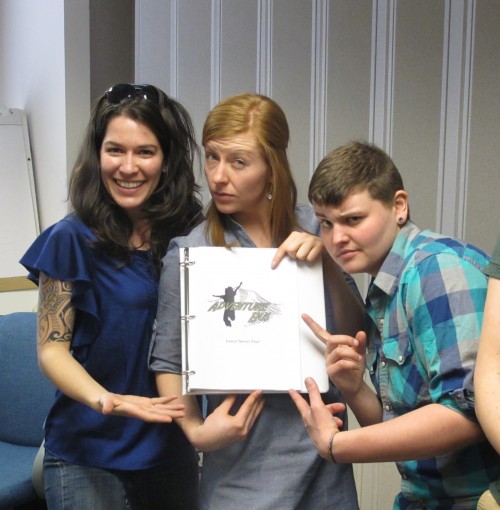 Graduate students Samantha Hale, Katie Komorowski and Kaci Darsow get ready to go adventure with some Tacoma teens. Photo by Debra Brodie.
Graduate students Samantha Hale, Katie Komorowski and Kaci Darsow get ready to go adventure with some Tacoma teens. Photo by Debra Brodie.
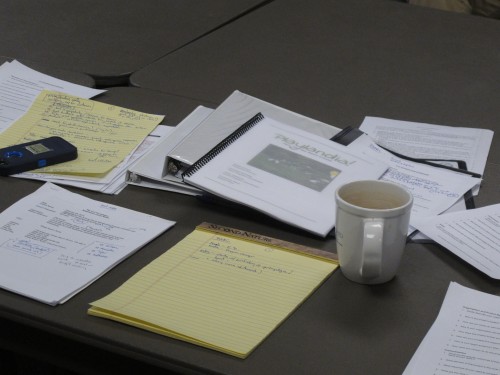 The C13 Foundation reviews each non-profit’s grant and looks over their bound, final projects, which are composed of dozens of documents including case statements, strategic plans and board biographies. Photo by Katherine Renz.
The C13 Foundation reviews each non-profit’s grant and looks over their bound, final projects, which are composed of dozens of documents including case statements, strategic plans and board biographies. Photo by Katherine Renz.
Playlandia!
Learn the way nature intended
Do you remember your favorite outdoor place to play when you were little? Maybe it was a secret fort, a vacant lot of tall grasses and red-winged blackbirds, or a simple suburban backyard transformed through a child’s eyes into a magical realm. Today, life is different for most modern children, and the problems they face are only increasing, including hours devoted to sitting behind a screen, rising obesity levels, and over-scheduling of structured activities and lessons. Stranger danger, ubiquitous liability concerns, and towns designed for cars, not people, all contribute to fewer opportunities for the free exploration of nature, and of themselves.
Playlandia!, a five acre nature playground located in the heart of Mount Vernon, WA, exists to alleviate these pressures. Our mission is to connect children, teens, and adults to the natural world and their community through providing a safe, imaginative playscape with opportunities for stewardship, experiential education, and youth leadership. In lieu of swing sets and plastic slides, Playlandia! has trees to climb, mud in which to squish, tools and tree branches with which to build forts, a small butterfly and food garden, and natural features such as winding pathways, a froggy pond, and boulders and logs to hide behind.
In addition to offering a “free play” membership, we have several programs, from Tierra for Toddlers and the high school-based EcoLeaders to our flagship After School Adventures for 3rd-5th graders. With trained naturalists on site and leading activities, children are encouraged to ask questions about the natural world if they choose, and/or they can participate in self-directed adventure and learn the way nature intended – through experience, exploration, and FUN! Get outside and play! Designed by Tyler Chisholm, Elissa Kobrin, Annabel Connelly, and Katherine Renz. Post written by Renz.


